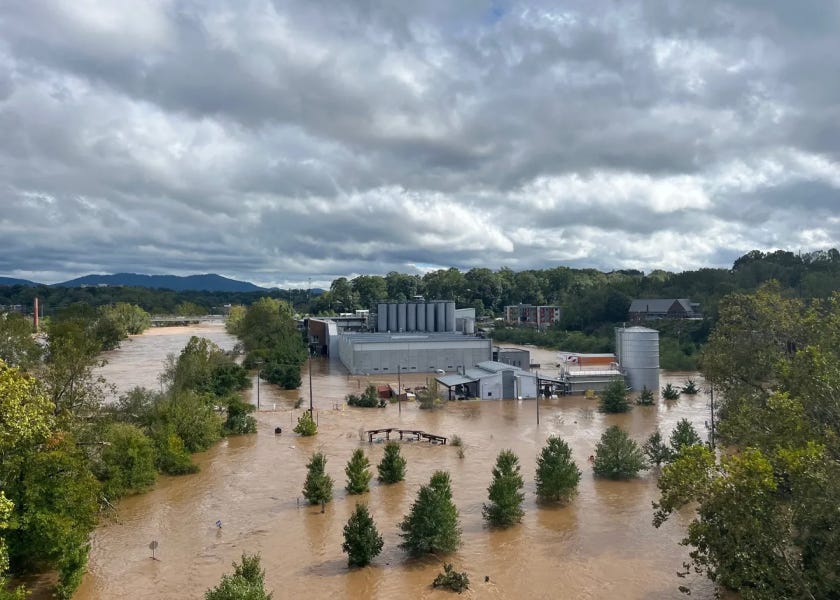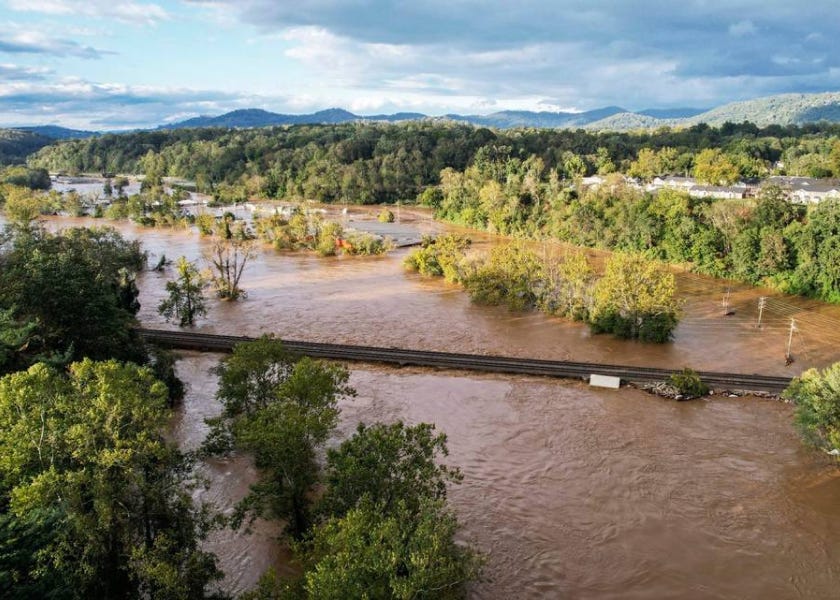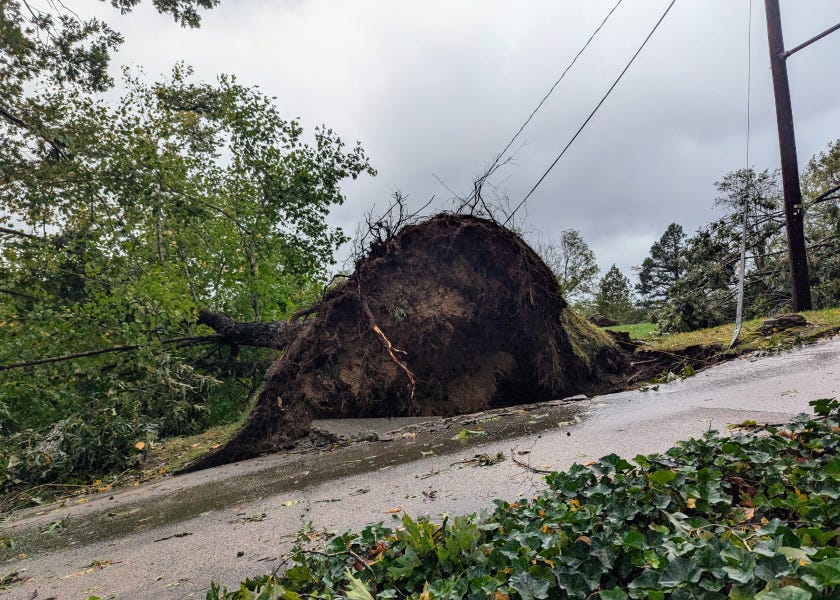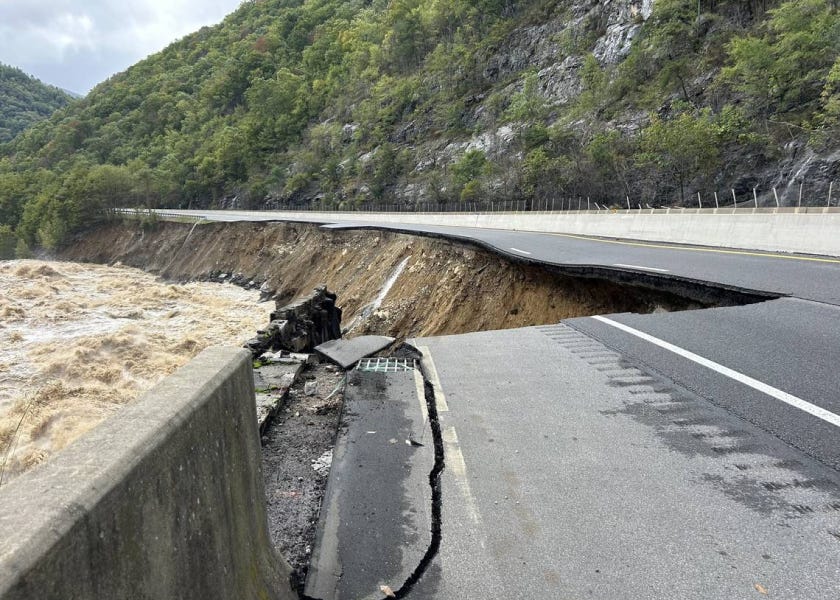My Hurricane Helene Experience
A break from normal newsletter programming
I’m struggling to shift back to “normal” when life feels anything but. Yet writing about Helene feels helpful in processing the experience and the rollercoaster of associated emotions.
Uncertainty
The night Hurricane Helene made landfall (Sept 26), I put my daughter to bed and went to sleep soon after with no fathomable idea of what was ahead. We were at my parents’ house (my childhood home) in Asheville, NC, at an elevation of 2,300 ft.
We had already received a ton of rain in a separate storm and were on a flood and tornado watch. I had asked another coach to be on standby for a group session I had led earlier that day in case we lost power/internet. My daughter’s field trip the following day with her new preschool had been canceled. We had collected some water, pulled out the flashlights, and bought a bit of extra food.
As the hurricane struck the Florida coast with Category 4 strength, my concern was for folks in that area. We knew certain areas of Asheville near the rivers would likely flood, and that a power outage was probable. But I had no sense of the destruction and loss that the region would soon experience.
Confusion
I awoke around 3 am to the loud beeping of a backup power supply for the modem and router, and rushed to turn it off to save the energy for later and avoid waking up my daughter. Outside, the rain was torrential and the wind was howling, but we had brought in patio furniture and other items that could potentially smash through the windows. It seemed OK to go back to sleep.
Throughout the rest of the night, loud crashes ensued. But it was hard to tell what was happening. It wasn’t until the light broke, Helene still in full force, that we had visibility into the storm.
Nostalgia
My siblings and I had grown up surrounded by massive trees – oak, maple, sycamore, black walnut, pine. They towered towards the sky, creating a canopy that cooled the entire yard (and house) in summer. The giant trees provided homes and food for wildlife in the area and the structure for a natural playground when we were kids, including many swings and a mini zip-line.
Terror
In the dawn light, we watched almost every one of those trees fall down one after the other, right in front of our eyes. The wind was consistently present and rattling, but the major gusts were terrifying. The counterclockwise direction of the winds let you know the general direction the trees would fall. But the house was of course surrounded. We wore helmets and kept moving from room to room to avoid getting potentially smashed, holding my daughter tight.
The trees were all strong, healthy, and upright before the storm. If we saw one leaning in an unnatural direction, we knew it would soon go down. Saturated root systems with nothing solid left to hold on to were yanked out of the ground or ripped apart, toppling the trees. Others were reduced to the bottom half of their trunks, with tops completely ripped off (we later learned there were also tornadoes in the mix).
It was a wait-and-scramble game, all the while trying to keep my daughter calm by reading her books and telling her stories. We could send sporadic text messages then, so my parents tried to reach the neighbors, especially ones who appeared to have trees through their roofs. I let a couple of my NYC friends know that we were OK.
Shock
When the storm appeared to calm, we began taking stock through the windows. Without internet, we didn’t know whether we were in the eye of the storm, or if it was moving out. Unbelievably, there were no direct hits to the house. It appeared as though trees in our yard had smashed a car, and nearby storage buildings belonging to neighbors.
But the neighborhood was unrecognizable. It looked like a downed forest, with cracked telephone poles, transformers, and wires all mixed in, stretching across properties and roads, blending everything together into one huge mess.
When the animals started reappearing, it seemed like a sign that the worst was over. Bluebirds, blue jays, chipmunks, crows, even one of the neighborhood bears. They seemed confused and displaced, but also excited about the wealth of acorns and worms now covering the ground.
Focus
Later that morning, a father-son duo appeared out of nowhere in the (now) soft rain, wearing hard hats and bearing chainsaws. Neighbors from a nearby street, they were systematically clearing trees from the roads. Folks started popping out of their houses, and everyone who could, joined the efforts. One of the massive trees that was blocking the driveway to several houses up the hill proved impenetrable to the chainsaws (it was finally cleared 7 days later).
In a moment of levity, I was warned to move out of the way of a 75 year-old neighbor with cochlear implants.
Watch out – you’re working with a deaf guy with a chainsaw – better be careful!
It took a little while for my daughter (who’s two and a half) to understand our situation. No, we couldn’t just open the fridge at whim for a snack; no, we can’t turn on the lights; no, we can’t warm up those leftovers. But she learned to adapt, accepting a sponge-down to clean off (we thought we still had water at that point but it turned out to just be whatever was left in the pipes) and making puzzles by candlelight.
By the second day, the immediate streets were cleared enough to leave by car, assuming all the power lines crisscrossing the roads were dead. My dad and several stuck neighbors ventured out in search of water, food, gas, internet, charging stations — anything helpful really. Priorities included contacting loved ones, learning about the regional impact, filing insurance claims, and getting on the lists of roofers and tree services.
They were gone for six hours and came back with very little except horror stories of historical flooding and casualties in river areas where homes and businesses had been completely washed away. Landslides had taken out swaths of major highways, and access to the area was severely restricted.

Thoughtful Community
But their creative problem-solving and bonding that day was a glimpse into the humanity that would soon be shining through everywhere you looked. Neighbors split up freezer remnants and pantry supplies to create makeshift meals over gas grills. A farmer set up a temporary farm stand in a parking lot. A food truck opened.
People rigged buckets from bridges to haul up water for flushing the toilet. Physicians set up wellness clinics in their front yards. Word spread if someone had satellite internet so folks could jump on their network to communicate. You could turn to a complete stranger for comfort, support, and resources.
And that was just the beginning. Search and rescue crews began helicopter missions. Shelters opened for displaced persons. Hordes of volunteers descended on the region. State and federal support came through en masse. Water distribution sites and mobile bathrooms/showers popped up.
Sadness & Grief
Ten days in, there’s still no electricity, reliable cell service, or water at the house. Power has been restored to many, and armies of workers are doing repairs around the clock. There’s no timeline for water system restoration — it could be months. Schools remain closed indefinitely.
The death toll has reached 227 storm-wide, and many still remain missing. The damage is jaw-droppingly astounding. Unfortunately, reports indicate that less than 3% of properties in NC have flood insurance. But can you blame folks? The storm was a 1-in-1000-year event.
Asheville’s economy is primarily driven by tourism, yet who knows when it will be a desirable destination again. Many folks working there — independent artists, musicians, small business owners, hospitality workers — have no workplace to show up to.
My daughter, mom, and I are lucky to be staying at my brother’s place in Raleigh. Coming here seemed to be the most sane thing to do, and my daughter is enjoying spending extra time with her cousin.
But there’s a gnawing feeling of guilt being away when there’s so much to be done. I’m glad my dad is on the ground collaborating with neighbors, friends, and crews to get shit done.
I’m still waiting on my diabetes supplies to be delivered, but have been making do with old, expired insulin that’s partially effective.
At this point, we’re in a day-by-day situation.

Just to provide some context on the power of Helene (most of this I didn’t learn until much later):
Helene intensified rapidly, due to record-warm waters in the Gulf of Mexico, a phenomenon expected to increase with climate change*
The storm was ENORMOUS, with a wind field extending almost 300 miles from its center*
20-30 inches of rain fell in some areas, which is ~40 TRILLION gallons!!
The Nolichuckey River Dam in TN took on 1.2 MILLION gallons of water per SECOND during the peak of the flooding, compared to Niagara Falls’ peak of 700K gallons/second
The French Broad River usually crests at 1.5 feet, but it reached 24.6 feet during the storm
Over 200 people have died storm-wide, with many still missing
Asheville’s water system infrastructure was decimated, leaving several treatment facilities in need of complete rebuilds (no timeline yet)
All of Asheville’s cell towers were downed (temporary towers setup, service remains sparce)
Millions of people lost power across states (the last 10% is going to take some serious time to restore)
400 roads across a quarter of NC were closed, interstates and backroads alike (major closures remain)
Property and economic losses from Helene estimates are up to $250 billion**
Here are a couple absolutely bonkers videos by Mark Huneycutt of nearby Swannanoa and Chimney Rock
*From Politico: Why North Carolina wasn’t prepared for Helene
**According to the National Center for Disaster Preparedness at Columbia University, for PBS
How to Help
Donate to on-the-ground volunteer organizations such as Beloved Asheville and MANNA FoodBank
Support Western North Carolina brands by shopping here
Contribute to a verified GoFundMe page of those significantly impacted
Take climate change seriously, and get ready for Milton, wherever you are located
AND/BOTH Podcast Episode
On a completely different note, the latest AND/BOTH podcast episode just dropped, featuring a conversation I had with host Dr. Ashley Blackington over the summer. We covered a wealth of topics including resilience, transition, and of course parental leave support (or lack thereof). Give it a listen and let me know what you think! Check it out on Spotify, Apple, or wherever you get your podcasts.








